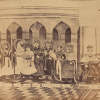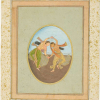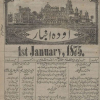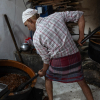A Pakkanar Kali singer and performer, Chakkuvally Kuttappan was the recipient of the Kerala Folklore Academy Award for Pakkanar Kali in 1988. His son, Manu P.K. is a Pakkanar Pattu singer in their Pakkanar Kali group, with over six years of experience. Chakkuvally Kuttappan and Manu P.K. briefly describe the stories behind the legend of Pakkanar. Chakkuvally Kuttappan also sings some songs from Pakkanar Kali and recounts the tale of Mahavishnu's paralysis, which was cured by Pakkanar.
Chakkuvalli Kuttappan (CK) sings
Hail my lord Ganesh, who presides over it all (x 2)
Manu P.K. (MPK) repeats
Hail my lord Ganesh, who presides over it all (x 2)
(CK continues singing)
There were two houses, the southern and the northern . . . (x 2)
(MPK sings along)
Hail my Lord Ganesh, who presides over it all
(CK singing)
In the southern house, the older woman, mother, Brahmin-mother
In the northern house, the younger woman, mother, Brahmin-mother
(MPK sings along)
Hail my lord Ganesh, who presides over it all (x 2)
(CK continues singing)
In the southern house, the older woman, mother, Brahmin-mother
In the northern house, the younger woman, mother, Brahmin-mother
(Both sing together)
Hail my lord Ganesh, who presides over it all (x 2)
CK: I intend to give a brief description of Pakkanar Kali. The story is believed to have taken place epochs ago, when Mahavishnu was alive. These two Brahmin mothers lived in illams (houses of Brahmins) south and north to Mahavishnu. Those days, the houses on earth were cleaned with the faeces of dogs and foxes, instead of cow dung. Since it had a foul smell, these mothers went to Mahavishnu and complained about it. He gave the Brahmin women, a cow named Painkirali. The cow was very thin.
Before offering the cow to these women, Mahavishnu had gone to his immensely large cowshed to ask if any of the cows there would be willing to go to earth. They had all said, ‘We will not go to earth as they will beat us with the rope they tie us with. So, we won’t go.’
He then asked the cow Painkirali if she would like to go to earth with the women. She nodded her head and ears in agreement. When she reached earth with these mothers, they fed her and took care of her really well. After some time, these women started fighting, with regard to the milk and milk pots. In the morning, they would get three to three-and-a-half measures of milk and in the evening, it was two to two-and-a-half. The morning share was given to the elder mother and her children, and the evening share to the younger mother and her children.
The cow fell ill and after some time it died. Upon its death, these mothers went to Mahavishnu, and he asked them to cremate the cow using sandalwood. He also asked the elder woman to stand at the head of the corpse and the younger one to stand near its legs. With his blessings, they came back to the earth using a thread, and cremated the cow with sandalwood.
While the corpse was burning, organs of the cow burst out due to the fire, and pieces of it fell over the two mothers. The children of the younger mother came with some leaves and cleaned her while the elder mother and children removed it with their bare hands. Later the family of the younger mother accused the elder mother of being meat eaters and asked them to leave the illam. They left the house and shifted to a small hut nearby. The mother cursed Mahavishnu for causing them all this trouble. This curse led to Mahavishnu suffering from a perennial illness, due to which he could neither stretch out his folded leg nor fold the leg that was stretched out. It was proclaimed that this paralysis could only be cured by Pakkanar with his music and performance called Pakkanar Kali.
Later, when Pakkanar was meditating beyond the seven seas, two beetles of Mahavishnu visited him and asked him to save Mahavishnu from his severe illness that had lasted 12 years. They requested Pakkanar to perform his Kali. Hence, when Pakkanar performed, Mahavishnu was saved. This is the brief story behind the performance.
The props for the performance are made of natural objects like the dried leaves of areca palms, which are shaped into a triangle with a width of 3 to 3.5 feet. This is fixed onto the head of the performer. The two characters here are called Pakkanar Kolam and Pakkathi Kolam, who are considered to be the incarnations of Shiva and Parvathi. The costume is simple. The tender leaves of coconut palm are used for decoration along with a red or black cloth underneath. Once this is wrapped around two to three times, it looks beautiful.
Pakkanar Kali takes around two hours to finish as they recite the entire story. The initial ritual involves the offering of a bundle of betel leaves, five areca nuts and blossoms from the areca palm to the deity. Pakkanar enters first and then comes Pakkathi. The ritual ends with the elimination of illness or other troubles, by giving a blessing. They carry bundles of green leaves (called thoopp, for cleaning) in both hands, made of leaves that do not wilt fast. We carry all these with us while going for a performance. The most suitable bundle of leaves is paanchi thoopp and we enter by uttering ‘thoopp thoopp’. Paanchi leaves stay fresh until the performance is over.
Traditionally, people would invite us to their homes to perform the ritual, as it was considered to be good for eliminating any issues pertaining to the house and its people. Mostly, these performances happen during the season of Onam.
Ajith Kumar A.S. (AKAS): Do people from all castes invite you to perform this?
CK: Yes, all castes, except the Brahmins. There are three singers with other instruments, like ganchira (a leather-bound percussion), thakil (leather drum) and mulanthudi (bamboo percussion). All these are used for the performance. The belief is that thudi was invented by Pakkanar.
After he cured Mahavishnu, the latter gave him the boon to use all trees that have no substance (heartwood) inside. This meant that he could only use bamboo and other grass plants to make baskets, winnows and other products. This is how the community began its traditional occupation of making and selling baskets, winnows and other similar products.
There is an interesting story about Pakkanar’s way of life. Pakkanar and his wife would make 10 murams (winnows) every day and take it to various houses to sell. He would give all 10 to the buyer and quote an exorbitant amount for it. When they refuse to pay that much, he would say ‘give me back all my nine murams’ to test the integrity of the buyer. Invariably, they would return only 9 out of the 10, thinking Pakkanar must have made a foolish mistake. He repeats this throughout until he is left with the last one muram which he would sell at a reasonable price that was barely enough to survive. Pakkanar and Pakkathiyar used to live off this meagre income.
The performance has a step inwards and a step outward in a rhythmic manner. It is performed according to this song.
MPK: I have been accompanying my father for this performance for the last three to four years; sometimes we travel outside the district. We all go to sing chorus to the performance.
(CK sings)
Hail my lord Ganesh, who presides over it all (x 2)
There is no time left, to sing Pakkanar’s history
My dear folks, Pakkanar has no one place, but many.
(MPK sings)
Hail my lord Ganesh, who presides over it all (x 2)
(CK sings)
What good news, on the way, Pakkanar?
The way Pakkanar comes, has to be swept and cleaned.
(MPK sings along)
Hail my lord Ganesh, who presides over it all (x 2)
(CK sings)
The four sit-outs shall be plastered with red soil (x 2)
The roofs shall be thatched with the dried leaves of coconut palm (x 2)
(MPK sings)
Hail my lord Ganesh, who presides over it all (x 2)
(CK sings)
A plantain leaf shall be cut and spread there (x 2)
Sandal pastes and large lamp with five wicks shall be placed.
(MPK sings)
Hail my lord Ganesh, who presides over it all (x 2)
(CK sings)
Full measure of paddy should be kept on the left of the lamp (x 2)
Golden tender coconut from the tender coconut palm shall be offered (x 2)
Pakkanar likes all these preparations (x 2)
We shall worship our lord, Pakkanar in this space
We shall make him stay, in this space.
The 12-member clan born of Parachi shall live like this (x 2)
The 12-member clan was fathered by the Brahmin Vararuchi
The mother of the clan was Kotha of Pandaramannath. (x 2)
Mezhathur Agnihotri was born into the 12-member clan
Chemmanthur Thirumeni was born into the 12-member clan
Uliyannur Perunthachan was born into the 12-member clan (x 2)
My lord Uppukottan was born into the 12-member clan (x 2)
The lord called Thiruvallur was born into the 12-member clan (x 2)
Akavoor Chathanar was born into the 12-member clan
Vaduthala Nair was born into the 12-member clan (x 2)
Karakkalamma was born into the 12-member clan (x 2)
Naranath Bhranthan was born into the 12-member clan (x 2)
Lord Pakkanar was born into the 12-member clan (x 2)
Lord Thirumangath Pananar was born into the 12-member clan (x 2)
The Mouthless Hill Deity was born into the 12-member clan.
Pakkanar comes from a thousand miles north (x 2)
Those days, when the five crore seas were a single one
With no origin and no end
The world stood for long
With no vedas and no base
With no one at the base
Without Brahma, Vishnu and Maheswara
The world stood for long
Without the nine planets, the world stood for long (x 2)
Without the 51 letters, the world stood for long.
During these times, an absence was felt
Two houses came up, the northern and the southern illams
In the southern house, the older woman, mother, Brahmin-mother
In the northern house, the younger woman, mother, Brahmin-mother
All had to plaster and clean houses
With the faeces of dogs and foxes
In the middle world of earth
Human beings could not bear the stench (x 2)
They need an animal to plaster and clean their houses . . .













